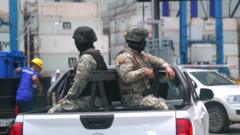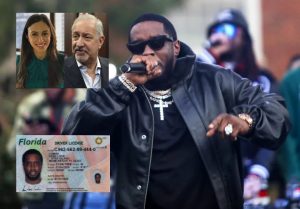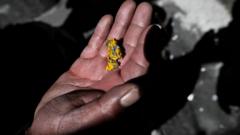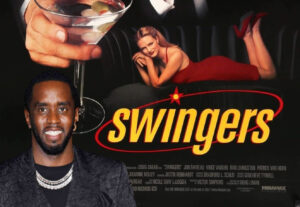Ecuador has become a critical transshipment point for cocaine destined for Europe, harnessing the country's geographical advantages despite not being a producer of the drug. Recent reports reveal a chilling narrative of gang violence intertwined with its thriving banana export economy amid soaring cocaine consumption in Europe.
### Cocaine Trade Crisis: Ecuador's Struggle Against the Albanian Mafia

### Cocaine Trade Crisis: Ecuador's Struggle Against the Albanian Mafia
Ecuador's role in the global cocaine trade has deepened as the Albanian mafia expands its operations, driven by increasing European demand.
César, an alias for a gang member involved with the Latin Kings in Ecuador, describes the coercive environment shaped by organized crime. He submits that he was forced into collaboration with the Albanian mafia through threats to his life. The alarming reach of these European networks stems from strategic routes established through Ecuador, allowing them to control cocaine distribution from South America.
President Daniel Noboa highlights a staggering statistic: around 70% of the world's cocaine passes through Ecuadorian ports, primarily smuggled from Colombia and Peru. The chaos of rampant violence accompanying this trade is reflected in grim statistics, with January 2025 marking a staggering 781 murders linked to the illicit drug market.
The systemic issues define César's involvement in the drug trade; he was drawn in at a young age, lacking viable job prospects. His bribery tactics, which involve corrupt officials at every stage, have allowed an ongoing expansion of the drug shipments. Ecuador's banana industry, responsible for 66% of the country's exports, serves as a convenient cover for traffickers to conceal illegal cargo among legitimate goods.
Observers like prosecutor "José" reveal that many trafficking organizations have begun operating under the guise of legitimate fruit businesses. The notoriety of Albanian figures within these networks, such as Dritan Gjika, exemplifies the depth of integration between legal and illegal economies.
Despite efforts from law enforcement—who employ patrols and rigorous searches of shipping containers—the drugs continue to flow. In 2024, nearly 300 tonnes of drugs were seized, highlighting a dangerous upward trend in cocaine shipments that intensify the risk for those involved in the supply chain.
Rising gang violence—heightened during the economic turmoil following the COVID-19 pandemic—has further exacerbated the recruitment of vulnerable locals into the trade. Noboa asserts the need for international cooperation to combat the roots of the problem, emphasizing that the "fun" European consumers are chasing is fraught with violence and loss of life.
The feedback loop of demand in Europe, especially within the UK—which hosts some of the highest cocaine use rates and demand—fuels this ongoing crisis in Ecuador. The National Crime Agency estimates a £11 billion cocaine market annually in the UK, underscoring the dire consequences that stem from this lucrative trade.
Communities in Ecuador are caught in the crossfire of this trade, with entire economies suffering due to criminal infiltration and societal disruption. As the struggle against the drug trade rages on, the message from Ecuador remains clear: systemic change in consumer nations is essential for stopping the cycle of violence and destruction.
The crisis continues to claim lives both in Ecuador and amongst users, echoing the urgent need for global awareness and action against the damaging effects of drug consumption and trafficking.
President Daniel Noboa highlights a staggering statistic: around 70% of the world's cocaine passes through Ecuadorian ports, primarily smuggled from Colombia and Peru. The chaos of rampant violence accompanying this trade is reflected in grim statistics, with January 2025 marking a staggering 781 murders linked to the illicit drug market.
The systemic issues define César's involvement in the drug trade; he was drawn in at a young age, lacking viable job prospects. His bribery tactics, which involve corrupt officials at every stage, have allowed an ongoing expansion of the drug shipments. Ecuador's banana industry, responsible for 66% of the country's exports, serves as a convenient cover for traffickers to conceal illegal cargo among legitimate goods.
Observers like prosecutor "José" reveal that many trafficking organizations have begun operating under the guise of legitimate fruit businesses. The notoriety of Albanian figures within these networks, such as Dritan Gjika, exemplifies the depth of integration between legal and illegal economies.
Despite efforts from law enforcement—who employ patrols and rigorous searches of shipping containers—the drugs continue to flow. In 2024, nearly 300 tonnes of drugs were seized, highlighting a dangerous upward trend in cocaine shipments that intensify the risk for those involved in the supply chain.
Rising gang violence—heightened during the economic turmoil following the COVID-19 pandemic—has further exacerbated the recruitment of vulnerable locals into the trade. Noboa asserts the need for international cooperation to combat the roots of the problem, emphasizing that the "fun" European consumers are chasing is fraught with violence and loss of life.
The feedback loop of demand in Europe, especially within the UK—which hosts some of the highest cocaine use rates and demand—fuels this ongoing crisis in Ecuador. The National Crime Agency estimates a £11 billion cocaine market annually in the UK, underscoring the dire consequences that stem from this lucrative trade.
Communities in Ecuador are caught in the crossfire of this trade, with entire economies suffering due to criminal infiltration and societal disruption. As the struggle against the drug trade rages on, the message from Ecuador remains clear: systemic change in consumer nations is essential for stopping the cycle of violence and destruction.
The crisis continues to claim lives both in Ecuador and amongst users, echoing the urgent need for global awareness and action against the damaging effects of drug consumption and trafficking.




















